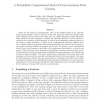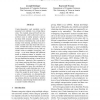70 search results - page 5 / 14 » Exemplar-Based Models for Word Meaning in Context |
COGSCI
2010
13 years 7 months ago
2010
Words are the essence of communication: they are the building blocks of any language. Learning the meaning of words is thus one of the most important aspects of language acquisiti...
NLDB
2007
Springer
14 years 1 months ago
2007
Springer
Word sense disambiguation is the task to identify the intended meaning of an ambiguous word in a certain context, one of the central problems in natural language processing. This p...
LREC
2008
13 years 8 months ago
2008
Vector-based models of lexical semantics retrieve semantically related words automatically from large corpora by exploiting the property that words with a similar meaning tend to ...
EMNLP
2011
12 years 7 months ago
2011
Context-dependent word similarity can be measured over multiple cross-cutting dimensions. For example, lung and breath are similar thematically, while authoritative and superfici...
HRI
2006
ACM
14 years 1 months ago
2006
ACM
We present a method of grounded word learning that is powerful enough to learn the meanings of first and second person pronouns. The model uses the understood words in an utteran...


